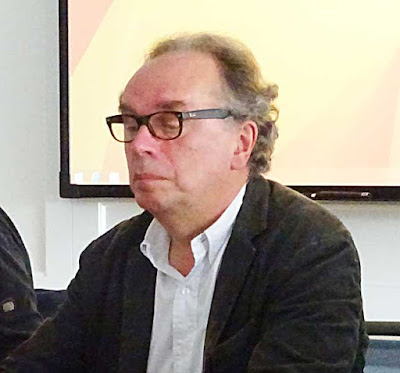I saw a notice somewhere about a session entitled "Untranslatable". Now that's a red rag to a bull and I signed up straight away, entered it in my diary and printed out the ticket. And then put it out of my mind.
When it came up on my calendar, I couldn't remember any of the details, if I'd ever read them. But I knew it was something I had at some stage thought I should go to.
Well, I turned up and it was not long before I came to the conclusion that either I was just out of my depth here or maybe I had stepped into a wormhole and come out the other end on the margins of Lewis Carroll's "Alice in Wonderland".
But I'm getting ahead of myself. A very nice lady welcomed us and ran through the housekeeping routine. If the place went up in smoke, the first option was out the front door. If that didn't prove possible we head towards the roof and enter the adjacent building through a secret passage. There was no suggestion that I should at any stage jump out the open window behind me.
Our MC was James Hadley who is currently working on the question of indirect translation. Anyone who has attended EU meetings will know what this means: the translator is translating from another translator rather than from the original speaker/writer. James's function today was to introduce us to the three speakers, one of whom had yet to arrive.
Olivier Salon kicked off, bringing us through some of his extremely challenging poems and the game of cat and mouse he was playing with one of his translators, Chris Clarke.
Olivier's poetry belongs to the Oulipo genre. I should have said that the subtitle of the session was "Constraints in Literary Translation".
Now I thought I knew what this might mean: syntax that didn't directly translate from one language to another or varying ranges of ambiguity between languages. I had come across this in my own translation work. But no. Nothing that simple. This stuff was like translating rubix's cube in motion.
Olivier, who writes in French was purposely setting traps and obstacles for his translator, Chris Clarke. Real bespoke stuff. And this was all within the standard mind-blowing constraints of the Oulipo movement. Check it out in the link above.
My head was beginning to vibrate by the time we came to the second speaker,
Jürgen Ritte. He took us through some translators' dilemmas. Whether to prioritise content or form in translating. He went through some computer generated stuff which involved breaking down the original into its constituent letters and mucking about with them.
He invoked Marcel Proust, which I gather is a bit like having a go at James Joyce's Ulysses, and, although it looked very interesting, I ended up little the wiser.
Finally, Ian Monk, took us through some of his encounters with his publishers who seemed to be very clued up in this area.
I really came away thinking that there is a whole alternative universe out there about which I know nothing but on which I should gen up a bit in case St. Peter turns out to be a fully paid up member of Oulipo.
The room was packed, as it had been for the earlier morning sessions.
The whole thing, which is a two day event on "Talking Translation" was organised by Literature Ireland (Trinity Centre for Literary Translation), along with the German and French embassies, the Goethe Institute, and the Franco-German Fund.
I wouldn't like what I said above to be taken in any way as a criticism of the organisers. When I got home I read the programme in detail in the course of preparing this post. This is the description of the session from that programme.
This session will discuss the concept of "untranslatability" and constraints in literary translation - and, in particular, the translation of constrained writing. What happens in translation when the original text has been "restricted" through the use of constrained writing techniques? And what do you do when the original has been written to be purposely untranslatable? These questions and broader issues of language potentialities will be explored by a panel of translation and constrained writing experts, with a special focus on Oulipo, the experimental French literary movement.It is quite clear then that the organisers gave us exactly what it said on the tin. Had I read all that in advance I would probably not have gone and would have ended up the poorer. Incidentally I also got a chance to look at the premises, the refurbished protected structure, Georgian house, which is 36 Fenian Street.
One thing that did strike me in retrospect was that the few interventions I made from the floor were off the wall in this particular context. People appear to have been very polite in the event, however.
Anyway, just in case all the above has blown your mind, I'll leave you with something simpler.
This is one of the pieces from the long lost d'Antin Manuscript. It should be read aloud by a real French person in the presence of a gaggle of monoglot anglophones. The last one to smile is a dunce.







Oulipôtable
ReplyDeleteVery circumflexing.